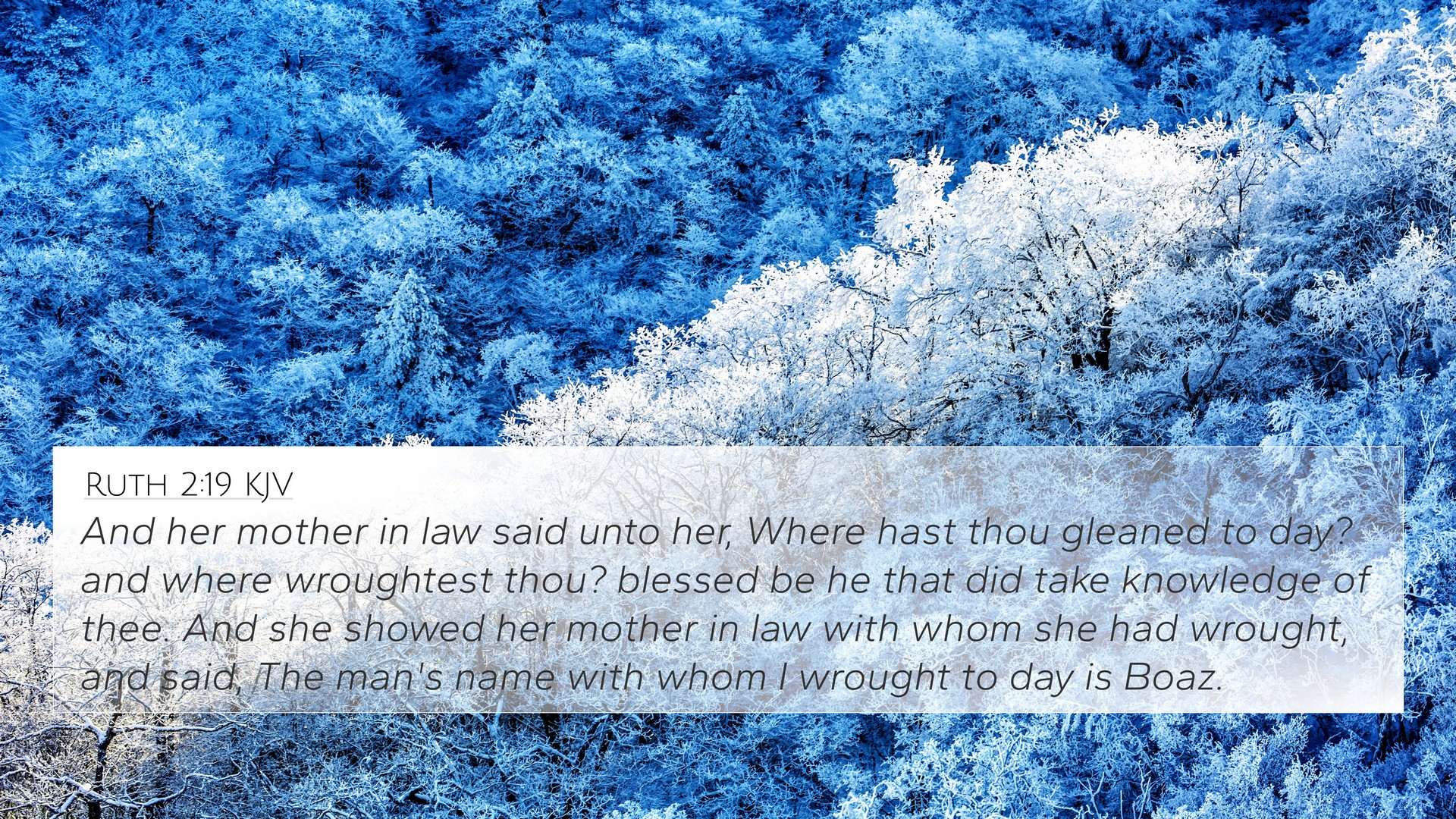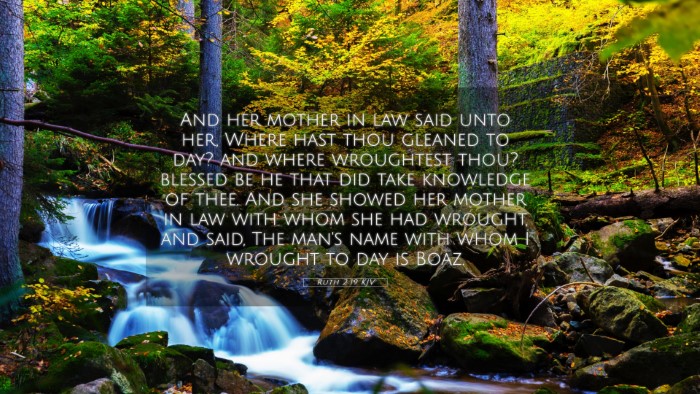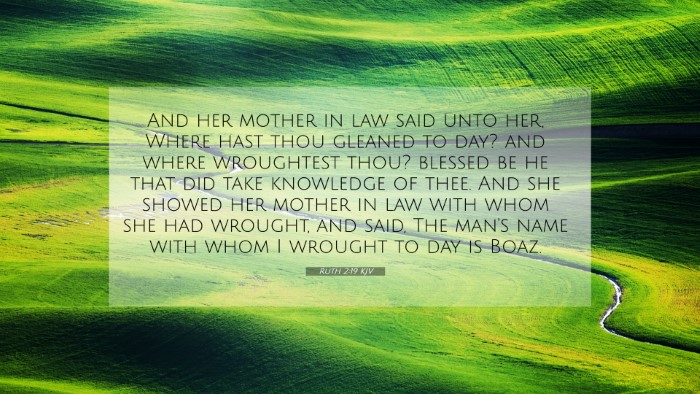Old Testament
Genesis Exodus Leviticus Numbers Deuteronomy Joshua Judges Ruth 1 Samuel 2 Samuel 1 Kings 2 Kings 1 Chronicles 2 Chronicles Ezra Nehemiah Esther Job Psalms Proverbs Ecclesiastes Song of Solomon Isaiah Jeremiah Lamentations Ezekiel Daniel Hosea Joel Amos Obadiah Jonah Micah Nahum Habakkuk Zephaniah Haggai Zechariah MalachiRuth 2:19 Similar Verses
Ruth 2:19 Cross References
And her mother in law said unto her, Where hast thou gleaned to day? and where wroughtest thou? blessed be he that did take knowledge of thee. And she showed her mother in law with whom she had wrought, and said, The man's name with whom I wrought to day is Boaz.
Uncover the Rich Themes and Topics of This Bible Verse
Listed below are the Bible themes associated with Ruth 2:19. We invite you to explore each theme to gain deeper insights into the Scriptures.
Ruth 2:19 Cross Reference Verses
This section features a detailed cross-reference designed to enrich your understanding of the Scriptures. Below, you will find carefully selected verses that echo the themes and teachings related to Ruth 2:19 KJV. Click on any image to explore detailed analyses of related Bible verses and uncover deeper theological insights.
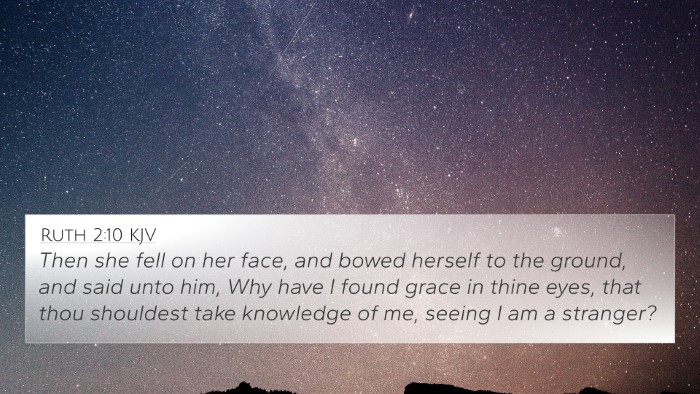
Ruth 2:10 (KJV) »
Then she fell on her face, and bowed herself to the ground, and said unto him, Why have I found grace in thine eyes, that thou shouldest take knowledge of me, seeing I am a stranger?
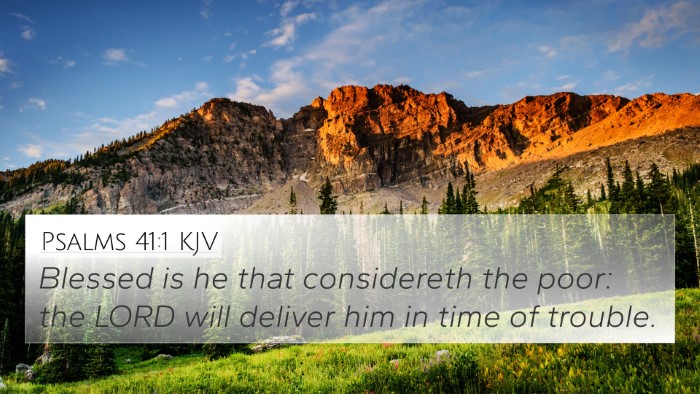
Psalms 41:1 (KJV) »
Blessed is he that considereth the poor: the LORD will deliver him in time of trouble.
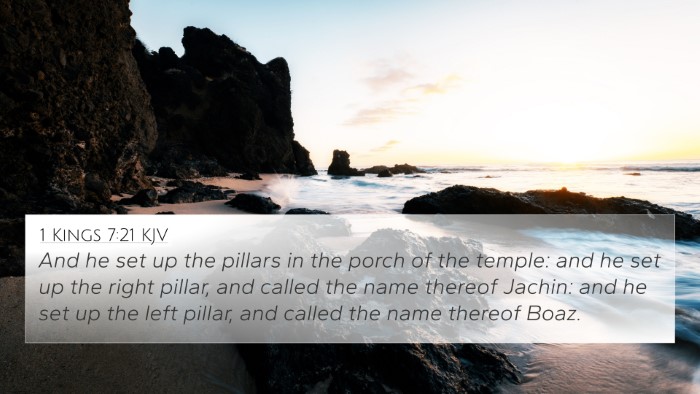
1 Kings 7:21 (KJV) »
And he set up the pillars in the porch of the temple: and he set up the right pillar, and called the name thereof Jachin: and he set up the left pillar, and called the name thereof Boaz.
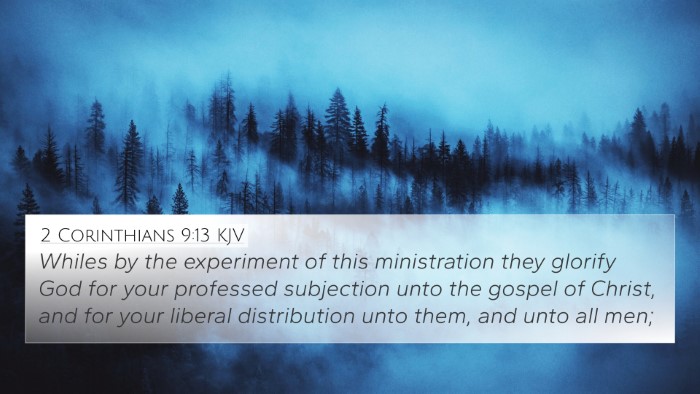
2 Corinthians 9:13 (KJV) »
Whiles by the experiment of this ministration they glorify God for your professed subjection unto the gospel of Christ, and for your liberal distribution unto them, and unto all men;
Ruth 2:19 Verse Analysis and Similar Verses
Understanding Ruth 2:19
The verse Ruth 2:19 states: "And her mother-in-law said unto her, Where hast thou gleaned today? and where wroughtest thou? Blessed be he that did take knowledge of thee. And she showed her mother-in-law with whom she had wrought, and said, The man’s name with whom I wrought today is Boaz."
Context and Overview
This verse occurs within the narrative of the Book of Ruth, which emphasizes themes of loyalty, kindness, and divine providence. Ruth, a Moabite widow, has returned to Bethlehem with her mother-in-law Naomi. By gleaning in the fields, she actively seeks sustenance, illustrating her dedication and industriousness.
Commentary Insights
Insights from various public domain commentaries highlight the richness of this verse:
-
Matthew Henry:
Henry notes the significance of gleaning during the barley harvest, a practice that demonstrates Ruth's humility and labor. He emphasizes that her gleaning leads to her meeting with Boaz, an event preordained by God's providence.
-
Albert Barnes:
Barnes highlights the inquiry of Naomi as a reflection of her concern for Ruth's well-being. He comments that Boaz is portrayed as a generous and kind individual, which is further underscored by Ruth's report of his acknowledgment and care towards her.
-
Adam Clarke:
Clarke provides insight into the cultural aspects of gleaning in ancient Israel, noting that this practice not only served the poor but also showed the community's responsibility to help each other. He views Boaz as a symbol of Christ, reflecting on the grace extended to Ruth despite her foreign status.
Thematic Connections
This verse is rich with thematic connections that link it to broader Biblical narratives:
- Divine Providence: The circumstances of Ruth's gleaning lead to her eventual marriage to Boaz, illustrating how God orchestrates events for the good of those who trust in Him (Romans 8:28).
- Community Support: The act of gleaning connects to passages emphasizing care for the vulnerable (Leviticus 19:9-10), establishing a biblical principle of social responsibility.
- Redemption: Boaz is referred to as a "kinsman-redeemer," foreshadowing Christ's redemptive role (Galatians 4:4-5).
Related Bible Cross References
Ruth 2:19 connects with several other Scriptures which enhance our understanding of its themes:
- Leviticus 19:9-10: Instructions on leaving gleanings for the poor.
- Galatians 3:28: The inclusivity of God's grace, akin to Ruth's incorporation into Israel.
- Matthew 1:5: Ruth is mentioned as part of the lineage of Christ.
- Isaiah 56:3-5: Promises of blessings for foreigners who adhere to God's covenant.
- Proverbs 31:20: A woman who is generous to the poor, reflecting Ruth’s character.
- Job 29:16: Job speaks of caring for the orphans and widows, paralleling Ruth's plight.
- Romans 15:4: How the Scriptures provide hope and understanding through their interconnected narratives.
Conclusion
Ruth 2:19 serves as a profound reminder of God’s providence and the importance of community support. As gleaning produces sustenance for Ruth, our engagement with the Word allows for spiritual sustenance, connecting us with God's larger narrative of redemption and grace. Through cross-referencing Bible verses, we gain deeper mastery of the scriptural text and are invited into an inter-Biblical dialogue that enhances our understanding of faith, resilience, and God's abiding kindness.
